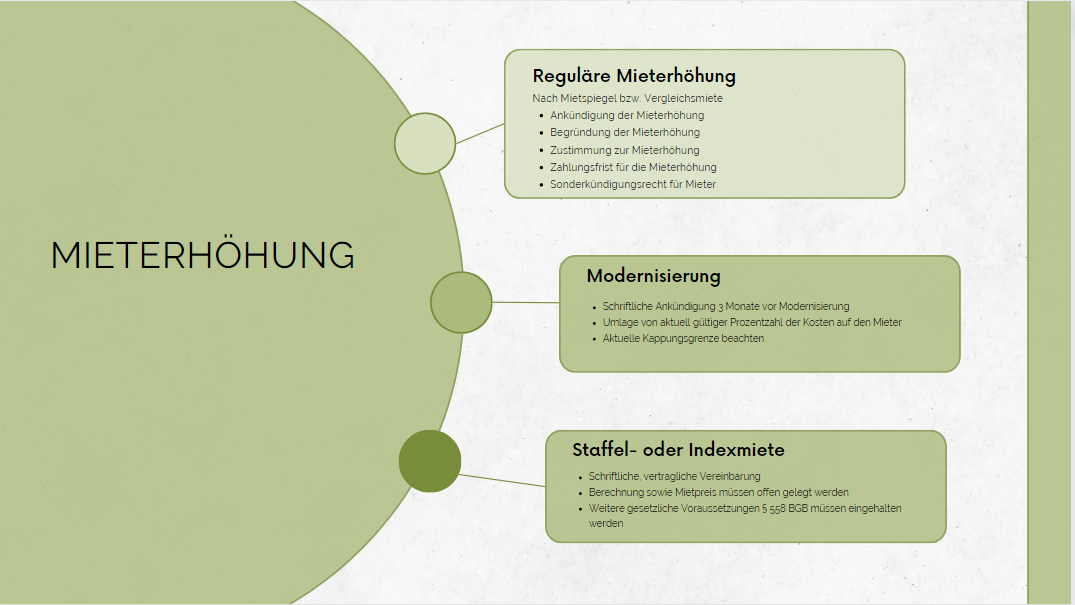Federal Court of Justice, 03.07.2013, Ref.: VIII ZR 354/12
Pursuant to Section 558a (1) BGB, the landlord's request for a rent increase must be explained to the tenant in text form and duly justified, and the landlord must first observe the appropriate form of the rent increase:
-
-
- In principle, the landlord must have drafted the rent increase letter himself. If the rent increase request was drawn up and sent by the administrator or other authorised representative, a sufficient power of attorney must also be sent.
- The request for a rent increase must be addressed to all tenants and not just to individual tenants.
- The reason for the rent increase request must be sufficiently explained. Simply stating keywords is not sufficient here.
- Precise explanation of the amount of the new rent (comparison of old and new rent and highlighting the difference)
- The effective date of the rent increase must be stated.
- Request for consent with a proper deadline.
-
If the rent increase is to be justified on the basis of a rent index, the landlord must observe further requirements:
-
-
- The rent index must be applicable to the municipality and the database of the rent index must be applicable to the rental property.
- The rent index must be up to date.
- It must be clearly explained why a particular grouping from the rent index is used for the rent increase.
- The requested new rent must be within the rent ranges of the rent index.
-
Depending on the type of tenancy agreement, the reason to be used for the rent increase, etc., further conditions for an effective rent increase may of course apply.
In the above-mentioned decision of the Federal Court of Justice, it had to decide whether the local comparative rent could be determined in the context of a rent increase on the basis of an expert opinion or whether the rent index of a neighbouring town had to be used.
Facts of the Case:
The defendants were tenants of terraced houses owned by the plaintiff in Geilenkirchen-Neutevern.
This district of Geilenkirchen was a former soldiers' housing estate built in 1953, which belonged to the immediately neighbouring current NATO AWACS airport and was now owned in its entirety by the plaintiff.
In 2009, the plaintiff demanded approval for an increase in the monthly net rent (in most cases to € 4.86 per square metre) with reference to the rent index for Geilenkirchen. The defendants did not give their consent.
Local court confirms rent increase by the landlord
After obtaining an expert opinion, the local court upheld the action for approval of the requested rent increase in whole or in part.
The expert opinion used was based on comparable flats in the former soldiers' housing estate, which the plaintiff had named to the expert.
Regional court only saw lower rent increase as justified
The court of appeal partially amended the judgements of the court of first instance and ordered the defendants - using the rent index of the city of Geilenkirchen - to agree only to a lower rent increase (€ 4.30 per sqm).
Decision of the Federal Court of Justice
According to the BGH, the expert opinion should have been based on more comparable rents
The BGH only partially agreed with this. According to the BGH, an expert opinion is unsuitable as a basis for determining the local comparative rent if it only takes into account comparable flats from a single housing estate owned by one and the same landlord.
This is because the expert must take into account a wide range of comparable flats from the municipality when determining the individual comparative rent.
The regional court was therefore right to base its judgement on the rent index
The Court of Appeal was therefore right to base its decision on the rent index of the town of Geilenkirchen and not on the expert opinion obtained at first instance.
However, the Court of Appeal had rejected the single-family house supplement provided for in the rent index on the grounds that this would exceed the maximum value of the rent index range and that this was inadmissible.
However, the regional court should have allowed the single-family house surcharge
This is legally incorrect. Such a surcharge is clearly intended to take account of circumstances that are not reflected in the ranges shown in the rent index.
As no further findings were to be expected, the BGH estimated the single-family house surcharge itself and arrived at a local comparative rent of €4.41 per square metre.

Source: Federal Court of Justice
Important Note: The content of this article has been prepared to the best of our knowledge and belief. However, due to the complexity and constant evolution of the subject matter, we must exclude liability and warranty. Important Notice: The content of this article has been created to the best of our knowledge and understanding. However, due to the complexity and constant changes in the subject matter, we must exclude any liability and warranty.
If you need legal advice, feel free to call us at 0221 – 80187670 or email us at info@mth-partner.de.
Lawyers in Cologne provide advice and representation in tenancy law.

